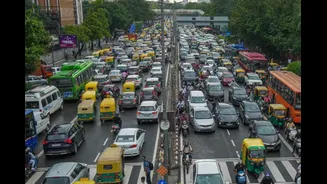Starting November 1, all commercial goods vehicles registered outside Delhi and not meeting BS-VI emission norms will be banned from entering the national capital. This major step has been taken under
the direction of the Commission for Air Quality Management (CAQM) to tackle the worsening air quality in Delhi.
The move comes as the city faces a sharp rise in pollution levels during the winter season. Authorities have reportedly said teams will be stationed at toll plazas and checkpoints to ensure strict enforcement of the new rule.
Key Ban Rules
According to a notice by the Delhi Transport Department, non-BS-VI compliant commercial goods vehicles from outside Delhi will not be allowed to enter the city from November 1, this year. However, BS-IV diesel vehicles registered in Delhi will be allowed to operate within the city until October 31, 2026, as part of a transition phase.
There will be no restrictions on the entry of vehicles running on CNG, LNG, or electricity, or those that are BS-VI compliant. The notice also clarified that restrictions under the Graded Response Action Plan (GRAP) will continue to apply whenever specific GRAP stages are in force, depending on pollution levels.
The CAQM’s order follows a meeting held on October 17, where it approved a sweeping ban on polluting commercial vehicles to reduce emissions.
Penalties For Violating Rules
Authorities have reportedly warned that any vehicle found violating the restrictions will face strict penalties under the Motor Vehicles Act.
As per reports, teams from the transport and traffic departments will be deployed at entry points to check vehicle compliance. Officials have also been told to ensure CCTV cameras at border checkpoints are functioning properly.
Senior officials reportedly said all departments have been sensitised about pollution control directives from both the CAQM and the National Green Tribunal (NGT). They have also been instructed to monitor construction sites and waste burning, which are major pollution sources.
Will The Ban Impact The Transportation Of Essential Goods
Officials reportedly clarified that the ban will not disrupt the supply of essential commodities, as vehicles transporting daily-use items and running on clean fuel or BS-VI engines will be exempted. However, transporters have expressed concern about logistics.
As quoted by NDTV, Bhim Wadhawa from the All India Motor Transport Congress said, “There is a time of one year for them during which BS-IV compliant vehicles will be allowed entry.”
Meanwhile, Rajendra Kapoor from the All India Motor and Goods Transport Association added, “If we want the restrictions on entry of BS-IV compliant vehicles not to be imposed even after the period of one year, we will have to approach the court.”
Will It Help In Improving Pollution Amid Hazardous AQI In Delhi
Officials believe the ban will help curb pollution by cutting emissions from old, highly polluting diesel trucks, which are one of Delhi’s major air quality offenders.
Between January 2023 and January 2024, authorities reportedly inspected over 30,000 non-destined goods vehicles at border points, and more than half were turned back for violating emission rules.
The government also plans to discourage non-destined trucks, those just passing through Delhi, from entering the city. In addition, a new renewable energy transmission line from Rajasthan is being set up to supply green power to Delhi, reducing dependence on coal-based energy.
Officials reportedly say these combined steps will not only improve Delhi’s air but also help the city transition toward cleaner, sustainable energy solutions.













